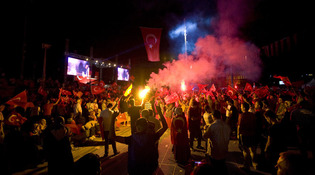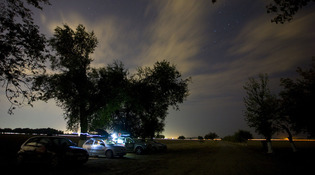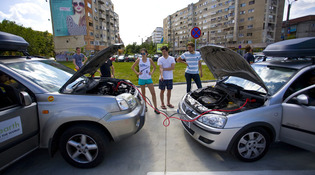 loading
loading
5 cars. 12 Yale grads. 10,000 miles to Ulaanbaatar. Mike NortonA pro-Erdogan rally in Taksim Square, Istanbul. The team entered Turkey a week after the failed coup of 2016. View full image Mike NortonCamping by a cotton field outside Ashgabat, Turkmenistan. In the morning, the Bad Latitudes would learn they’d been technically squatting on private land. The farmer, who showed them around his land, didn’t seem to mind. View full image Mike NortonTimisoara, Romania. The team experienced car trouble nearly every day of the trip. View full imageOn the road, other cars honk at us. We are a sight, as our vehicles are laden with decals: shout-outs to our sponsors, our own graffiti, and the Mongol Rally’s logo, captioned “Motoring Stupidity on a Global Scale.” One of our chariots, fondly named Yankee, is especially noticeable. It has a golden traffic cone strapped to its top like a two-foot-tall dunce cap. An SUV with a 2L engine, Yankee is our cheat car. The rally rules don’t allow anything above 1.2L (though, in fairness, “rules” on this trip are more like suggestions). When the organizers first saw Yankee, they called it, with disdain, “a nod to American exceptionalism if there ever was one.” At the rally’s launch in southern England, they “awarded” us the cone, amid a cascade of only-partly-joking boos from the other 300-some teams. The organizers also instructed all the other teams that if anyone saw us without the cone, they were to slash our tires. Mike accepted the cone for us while waving an American flag. On the road, every time we re-secured the cone—which was jostled again and again by all the potholes we couldn’t miss—Mike would swear he’d burn it. Almost exactly six weeks later, at the official finish line, he would delightedly light that cone on fire. In the glory shot, Yankee, flanked by the rest of our tired cars, is unadorned. At the launch, the rally’s organizers had predicted that only a third of the teams would reach the finish line. Our team would be one of the lucky third—though only a third of our team members would actually make it to the end.
By day nine, I’ve lost track of time; even my journal entries aren’t dated. Another day is another border and another gas station. We’ve driven through continental Europe, along the coast of the Black Sea, and into Turkey. Everyone in our group looks—and smells—awful. Our conversations devolve into punctuated exclamations about hot showers. Since we are hoping to make it to Mongolia in six weeks, we have allotted the bulk of our sightseeing time for the Central Asian leg of the trip, and we speed through Istanbul. The coup attempt is not long over, and the city is laden with red flags—flags above traffic lights, hanging from windows, draped over the backs of passersby, braceleting tree branches. We drive over the Bosphorus and enter Asia in the early afternoon. Sid, one of the calmest people I’ve met in my life, is at the wheel; he is seasoned by years of driving in India and completely unfazed by the terrifying Turkish traffic. We match the 90 mph pace of the cars around us and drive for 11 hours on two consecutive days, racing for an early arrival in Georgia. Thus far, we haven’t experienced any delays at borders, but our luck disappears as we exit Turkey. Miles of trucks and cars and buses waiting to enter Georgia line a highway wedged between steep hills planted with tea and the Black Sea, dazzling blue. The line is moving so slowly that we take a break from driving, put the cars in neutral, and push them a few feet forward every half hour. The border crossing is next to a beautiful beach, facing west just as the sun begins to set. Several of us, choosing to ignore what looks suspiciously like an open sewage line feeding into the water, go swimming. For a blurry eight hours, we sun-bathe, gorge on sandwiches from the roadside mosque’s gift shop, and take turns reading out loud from The Great Game, a book chronicling the travails of nineteenth-century Russian intelligence officers taking the same route we will take through Uzbekistan. Lauren switches on music, and “The Devil Went Down to Georgia” blasts from our cars as we finally make the crossing. There is a rare uninterrupted quality to the long drives. At Yale, there had never been enough time. Conversations were cut short by classes or commitments or dining hall hours. In the cars, we only stop conversations to gasp in appreciation at the scenery—Georgian castles, sheep-dotted valleys, sunsets. No longer strangers, we move to contentious topics: inequality and income distribution. I fill in the alums on the fall 2015 semester at Yale, and we argue about renaming colleges and trigger warnings. When we stop in the middle of an Azeri road to wait for a herd of cows to cross, James, still thinking of Yale, says, “I thought I’d miss it less over time, but I’ve only missed it more.” I pretend not to notice Juan, a non-Yalie, rolling his eyes. It occurs to me that I’m so focused on the day-to-day logistics of the rally—worrying about how often we break down and the scarcity of safe drinking water—that I’ve forgotten I need to figure out what comes next. As the final cow moves out of the way, I wonder if my feelings will evolve the same way as James’s.
|
|